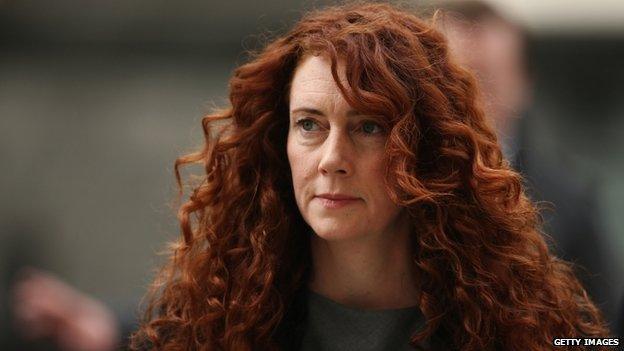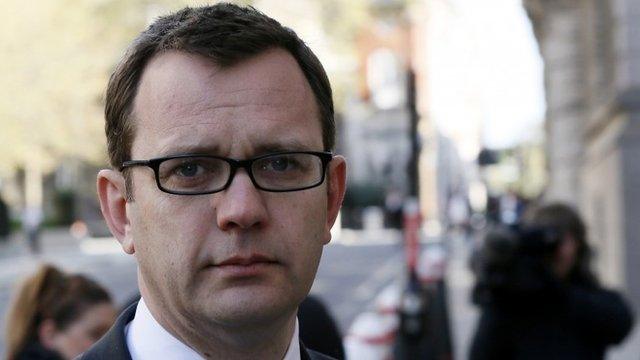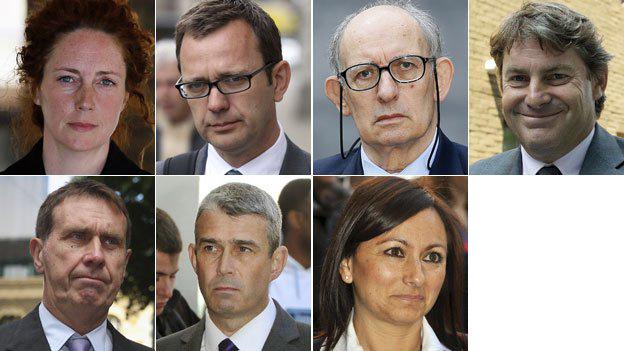Phone-hacking trial: Andy Coulson quizzed over 'dark arts'
- Published
Andy Coulson was questioned about phone hacking after 98 days of evidence at the trial, as Tom Symonds reports
Andy Coulson has said he should have paid more attention to the use of some of the "dark arts" while editor of the News of the World.
Mr Coulson told the hacking trial he believed the "investigative techniques" used by the newspaper were legal.
But he said he did not give the practice of getting information from "phone traffic" - by examining phone bills - enough thought.
Mr Coulson, 46, denies the charges against him.
Giving evidence for a second day, Mr Coulson, who also denied being involved in the hacking of murdered teenager Milly Dowler's mobile phone, was asked about the use of the "dark arts" while he was editor.
The court heard the News of the World's "school of excellence", which gave staff legal refreshers, briefed journalists about the "dangers of the dark arts".
'Phone traffic'
Asked what the phrase meant, Mr Coulson said it meant "investigative techniques" including surveillance, using hidden cameras or recording devices.
He was also asked about "blagging" information, as well as "turning" or "spinning" mobile phones, which he said meant getting a phone number from an address or vice versa.
Asked if they were phrases used in "common currency", Mr Coulson said: "I had certainly heard them, yes."
The former editor also said the phrase "phone traffic" was one he had heard, meaning "getting information about who was phoning who by looking at phone billing".
He told the jury the issue of how evidence could have been obtained was "an area I certainly should have applied my mind to more".
"I should have looked at it more, interrogated it more," he added.
'Intrusive'
Earlier, Mr Coulson said he had been unaware murdered Milly Dowler's mobile phone had been hacked by the paper.
The jury has previously heard that Mr Coulson was in charge of the newspaper in April 2002 - when murdered schoolgirl Milly Dowler's phone was hacked - while editor Rebekah Brooks was on holiday.
The hacking was carried out by private investigator Glenn Mulcaire, whom the trial previously heard was paid about £100,000 a year by the newspaper.
Mr Coulson resigned from the News of the World following the conviction of Mulcaire and the tabloid's former royal editor Clive Goodman for phone hacking.
When asked by his barrister, Timothy Langdale QC, whether he had been aware of any hacking by his paper in relation to Milly Dowler, he replied: "No I was not."
Milly was 13 when she vanished as she walked home from school in Walton-on-Thames in March 2002. Her remains were found six months later in woods in Hampshire.
The first edition of the newspaper on 14 April 2002 - while the search for Milly was ongoing - referred to material contained in voicemails on the teenager's phone.
However, the references were subsequently removed in later editions.
Mr Coulson said the 14 April story had been altered and moved from page nine to page 30 by the third edition for "cosmetic reasons".
He said "the mix" of serious and lighter stories was wrong and denied, as the prosecution have suggested, the decision was made to conceal references to voicemail hacking.
He said he would have viewed it as a "pretty unremarkable" story and it would not have occurred to him from the content that anybody at the News of the World may have hacked into Milly's messages.

Rebekah Brooks, who has already given evidence in the trial, denies three charges
"I may have concluded that it came from sources, maybe police sources," he added.
Mr Coulson, who later worked as Downing Street director of communications, said he had been aware of rumours of phone hacking at the time of the Milly Dowler story but said stories of hacking had been "in the ether".
Asked whether, given that he did not know at the time that hacking was a crime, he "would have had any problems with it", he replied: "I would have thought it was intrusive.
"I would have thought that it was a breach of privacy, and I also would have thought that it was lazy journalism."
'No interference'
Mr Coulson was asked about the paper's relationship with the police.
He said "catching criminals" was part of its "DNA" and that meant working closely with the police on many stories.
He said it was not the News of the World's role "to interfere in police investigations".
Mr Coulson said he did not remember being aware that two of his staff had been in contact with police about Milly Dowler's voicemails.
But asked how he would have felt if he had known that his paper had been accessing them, he said he would have been "very concerned about it".
The court was told about numerous texts and phone calls between Mr Coulson and Mrs Brooks while he was in charge of the paper and she was on holiday in April 2002.
But Mr Coulson said he could not remember "having any conversation about Milly Dowler" with Mrs Brooks.
Asked if there had been a "bullying culture" at his time at the News of the World, Mr Coulson said: "I absolutely reject that."
Earlier in the trial, former royal editor Clive Goodman said the culture at the newspaper at the time had been "menacing", while reporter Dan Evans told the court he had been bullied to find front page stories.
Mr Coulson said the News of the World was a "very tough place to work at times", but denied suggestions he was a bully.
"As an editor I tried to be fair. I was, I'm sure, firm at times," he added.
Mr Coulson denies conspiracy to hack phones and conspiracy to commit misconduct in a public office.
The former editor is the last of seven defendants, who deny all charges against them, to give evidence.
The trial continues.
- Published14 April 2014

- Published25 June 2014
